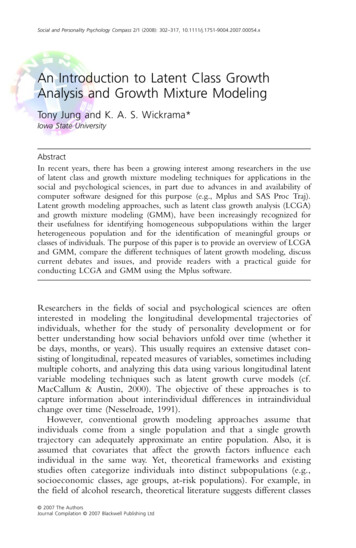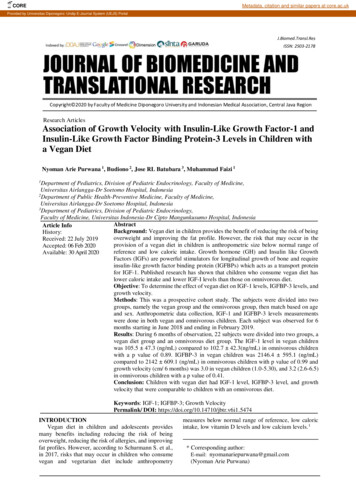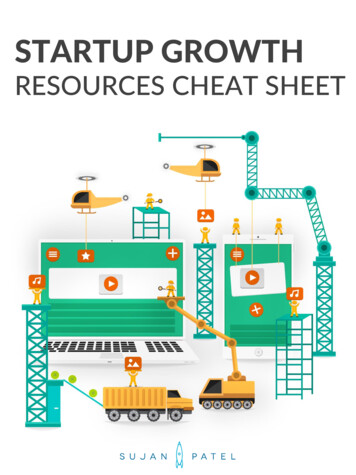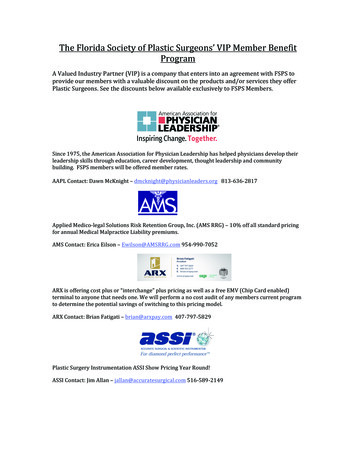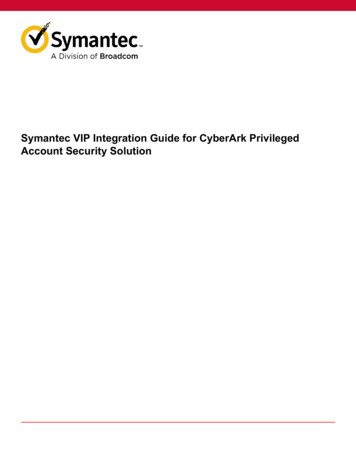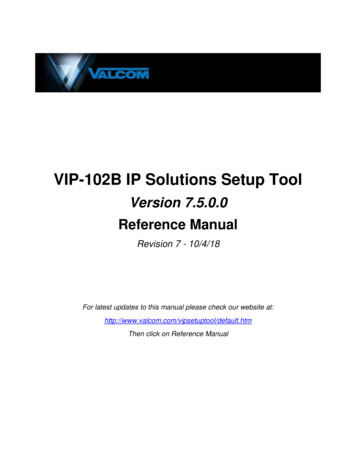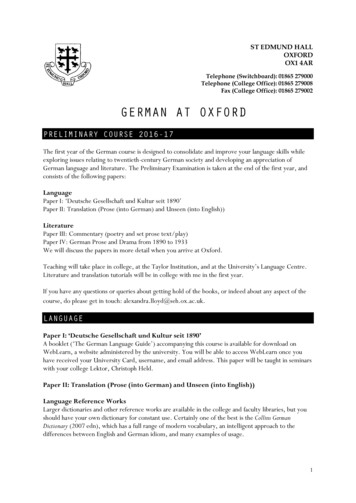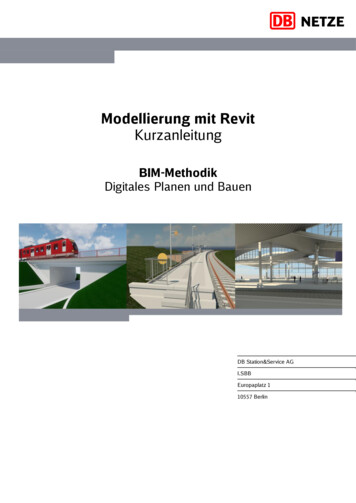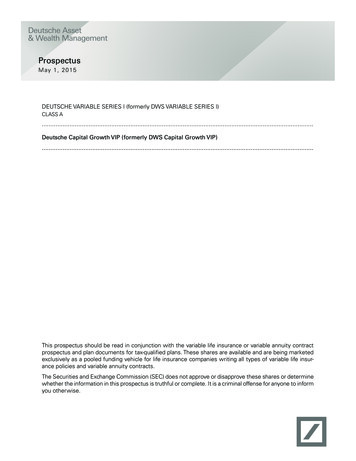
Transcription
ProspectusM ay 1, 2015DEUTSCHE VARIABLE SERIES I (formerly DWS VARIABLE SERIES I)CLASS A.Deutsche Capital Growth VIP (formerly DWS Capital Growth VIP).This prospectus should be read in conjunction with the variable life insurance or variable annuity contractprospectus and plan documents for tax-qualified plans. These shares are available and are being marketedexclusively as a pooled funding vehicle for life insurance companies writing all types of variable life insurance policies and variable annuity contracts.The Securities and Exchange Commission (SEC) does not approve or disapprove these shares or determinewhether the information in this prospectus is truthful or complete. It is a criminal offense for anyone to informyou otherwise.
Table of ContentsINVESTING IN THE FUNDDEUTSCHE CAPITAL GROWTH VIPInvestment Objective. . . . . . . . . . . . . . . . . . . . . . . . . . . . . . . .Fees and Expenses of the Fund . . . . . . . . . . . . . . . . . . . . .Principal Investment Strategy . . . . . . . . . . . . . . . . . . . . . . .Main Risks . . . . . . . . . . . . . . . . . . . . . . . . . . . . . . . . . . . . . . . . . .Past Performance. . . . . . . . . . . . . . . . . . . . . . . . . . . . . . . . . . . .Management . . . . . . . . . . . . . . . . . . . . . . . . . . . . . . . . . . . . . . . .Purchase and Sale of Fund Shares. . . . . . . . . . . . . . . . . . .Tax Information . . . . . . . . . . . . . . . . . . . . . . . . . . . . . . . . . . . . . .Payments to Financial Intermediaries. . . . . . . . . . . . . . . .111223333999121313FINANCIAL HIGHLIGHTS . . . . . . . . . . . . . . . . . . . . . .14APPENDIX . . . . . . . . . . . . . . . . . . . . . . . . . . . . . . . . . . . . . . . .151515Hypothetical Expense Summary. . . . . . . . . . . . . . . . . . . . .Additional Index Information. . . . . . . . . . . . . . . . . . . . . . . . .FUND DETAILSAdditional Information About Fund Strategies andRisks . . . . . . . . . . . . . . . . . . . . . . . . . . . . . . . . . . . . . . . . . . . . . . . .Deutsche Capital Growth VIP . . . . . . . . . . . . . . . . . . . . . . . .Other Policies and Risks. . . . . . . . . . . . . . . . . . . . . . . . . . . . .Who Manages and Oversees the Fund . . . . . . . . . . . . . .Management . . . . . . . . . . . . . . . . . . . . . . . . . . . . . . . . . . . . . . . .Your Investment in the Fund . . . . . . . . . . . . . . . . . . . . . . . . .Policies about transactions . . . . . . . . . . . . . . . . . . . . . . . . . .Buying and Selling Shares . . . . . . . . . . . . . . . . . . . . . . . . . . .How the Fund Calculates Share Price . . . . . . . . . . . . . . .Distributions. . . . . . . . . . . . . . . . . . . . . . . . . . . . . . . . . . . . . . . . .Taxes . . . . . . . . . . . . . . . . . . . . . . . . . . . . . . . . . . . . . . . . . . . . . . . .44667YOUR INVESTMENT IN THE FUND IS NOT A BANK DEPOSIT AND IS NOT INSURED OR GUARANTEED BY THEFEDERAL DEPOSIT INSURANCE CORPORATION OR ANY OTHER GOVERNMENT AGENCY, ENTITY OR PERSON.
Deutsche Capital Growth VIP(formerly DWS Capital Growth VIP)INVESTM ENT OB J E CT IV EThe fund seeks to provide long-term growth of capital.F EES AND EXPEN S E S O F T H E F UN DThis table describes the fees and expenses you may pay ifyou buy and hold shares of the fund. This information doesnot reflect fees associated with the separate account thatinvests in the fund or any variable life insurance policy orvariable annuity contract for which the fund is an investment option. These fees will increase expenses.0.37NoneOther expenses0.13Total annual fund operating expenses0.50EXAM PLEThis Example is intended to help you compare the cost ofinvesting in the fund with the cost of investing in othermutual funds. The Example assumes that you invest 10,000 in the fund for the time periods indicated and thenredeem all of your shares at the end of those periods. TheExample also assumes that your investment has a 5%return each year and that the fund’s operating expensesremain the same. This example does not reflect any fees orsales charges imposed by a variable contract for whichthe fund is an investment option. If they were included,your costs would be higher.May 1, 2015 51 160 280 628Management process. In choosing stocks, portfoliomanagement begins by utilizing proprietary quantitativemodels to rank stocks based on a number of factorsincluding valuation and profitability. Portfolio managementAlthough your actual costs may be higher or lower, basedon these assumptions your costs would be:Prospectus10 YearsPRIN CIPAL IN VESTMEN T STRATEG YMain investments. The fund normally invests at least 65%of total assets in equities, mainly common stocks of UScompanies. The fund generally focuses on establishedcompanies that are similar in size to the companies in theS&P 500 Index (generally 500 of the largest companies inthe US) or the Russell 1000 Growth Index (generallythose stocks among the 1,000 largest US companies thathave relatively higher price-to-earnings ratios and higherforecasted growth values). While the market capitalizationranges of the S&P 500 Index and the Russell 1000 Growth Index change throughout the year, as of the mostrecent reconstitution dates of the indexes (March 20, 2015and June 27, 2014, respectively), companies in the S&P500 Index and the Russell 1000 Growth Index hadmedian market capitalizations of approximately 19.03billion and 8.79 billion, respectively. Although the fund caninvest in companies of any size, the fund intends to investprimarily in companies whose market capitalizations fallwithin the normal range of these indexes. The fund mayalso invest in other types of equity securities such aspreferred stocks or convertible securities.(expenses that you pay each year as a % of the value of your investment)Distribution/service (12b-1) fees5 YearsPortfolio turnover rate for fiscal year 2014: 47%.NoneANNUAL FUND O P E RAT IN G E X P E N S E SManagement fee3 YearsPO RTFO LIO TURNOVERThe fund pays transaction costs, such as commissions,when it buys and sells securities (or “turns over” its portfolio). A higher portfolio turnover may indicate highertransaction costs. These costs are not reflected in annualfund operating expenses or in the expense example, butcan affect the fund’s performance.SHAREHOLDER FE E S(paid directly from your investment)1 Year1Deutsche Capital Growth VIP
also applies fundamental factors to seek to identify companies that display above-average earnings growth comparedto other companies and that have strong product lines,effective management and leadership positions within coremarkets. The fundamental factors considered and quantitative models used by portfolio management may changeover time.Medium-sized company risk. Medium-sized companystocks tend to be more volatile than large company stocks.Because stock analysts are less likely to follow mediumsized companies, less information about them is availableto investors. Industry-wide reversals may have a greaterimpact on medium-sized companies, since they lack thefinancial resources of larger companies. Medium-sizedcompany stocks are typically less liquid than largecompany stocks.Portfolio management will normally sell a security when itbelieves the potential risks have increased, its price isunlikely to go higher, its fundamental factors havechanged, other investments offer better opportunities or inthe course of adjusting the fund’s emphasis on a givenindustry.Small company risk. Small company stocks tend to bemore volatile than medium-sized or large company stocks.Because stock analysts are less likely to follow smallcompanies, less information about them is available toinvestors. Industry-wide reversals may have a greaterimpact on small companies, since they may lack the financial resources of larger companies. Small company stocksare typically less liquid than large company stocks.Securities Lending. The fund may lend securities (up toone-third of total assets) to approved institutions.MAIN RISKSThere are several risk factors that could hurt the fund’sperformance, cause you to lose money or cause the fund’sperformance to trail that of other investments. The fundmay not achieve its investment objective, and is notintended to be a complete investment program. An investment in the fund is not a deposit of a bank and is notinsured or guaranteed by the Federal Deposit InsuranceCorporation or any other governmental agency.Foreign investment risk. The fund faces the risksinherent in foreign investing. Adverse political, economicor social developments could undermine the value of thefund’s investments or prevent the fund from realizing thefull value of its investments. Financial reporting standardsfor companies based in foreign markets differ from thosein the US. Additionally, foreign securities markets generallyare smaller and less liquid than US markets. To the extentthat the fund invests in non-US dollar denominated foreignsecurities, changes in currency exchange rates may affectthe US dollar value of foreign securities or the income orgain received on these securities.Stock market risk. When stock prices fall, you shouldexpect the value of your investment to fall as well. Stockprices can be hurt by poor management on the part of thestock’s issuer, shrinking product demand and other business risks. These may affect single companies as well asgroups of companies. In addition, movements in financialmarkets may adversely affect a stock’s price, regardless ofhow well the company performs. The market as a wholemay not favor the types of investments the fund makes,which could affect the fund’s ability to sell them at anattractive price. To the extent the fund invests in aparticular capitalization or sector, the fund’s performancemay be affected by the general performance of thatparticular capitalization or sector.Securities lending risk. Any decline in the value of a portfolio security that occurs while the security is out on loanis borne by the fund and will adversely affect performance.Also, there may be delays in recovery of securities loanedor even a loss of rights in the collateral should theborrower of the securities fail financially while holding thesecurity.Liquidity risk. In certain situations, it may be difficult orimpossible to sell an investment in an orderly fashion at anacceptable price.Growth investing risk. As a category, growth stocks mayunderperform value stocks (and the stock market as awhole) over any period of time. Because the prices ofgrowth stocks are based largely on the expectation offuture earnings, growth stock prices can decline rapidlyand significantly in reaction to negative news about suchfactors as earnings, the economy, political developments,or other news.Pricing risk. If market conditions make it difficult to valuesome investments, the fund may value these investmentsusing more subjective methods, such as fair value pricing.In such cases, the value determined for an investmentcould be different from the value realized upon such investment’s sale. As a result, you could pay more than themarket value when buying fund shares or receive less thanthe market value when selling fund shares.Security selection risk. The securities in the fund’s portfolio may decline in value. Portfolio management could bewrong in its analysis of industries, companies, economictrends, the relative attractiveness of different securities orother matters.ProspectusMay 1, 2015PAST PERFO RMAN CEHow a fund’s returns vary from year to year can give anidea of its risk; so can comparing fund performance tooverall market performance (as measured by an appropriate market index). Past performance may not indicatefuture results. All performance figures below assume thatdividends and distributions were reinvested. For more2Deutsche Capital Growth VIP
TAX IN FO RMATIO NThe fund normally distributes its net investment incomeand realized capital gains, if any, to its shareholders, theseparate accounts of participating insurance companies.These distributions may not be taxable to the holders ofvariable annuity contracts and variable life insurance policies. For information concerning the federal income taxconsequences for the holders of such contracts or policies,holders should consult the prospectus used in connection with the issuance of their particular contracts orpolicies.recent performance figures, go to deutschefunds.com (theWeb site does not form a part of this prospectus) or callthe phone number included in this prospectus. This information doesn’t reflect fees associated with the separateaccount that invests in the fund or any variable life insurance policy or variable annuity contract for which the fundis an investment option. These fees will reduce returns.CAL ENDAR YEAR TOTA L R ET U RN S (%) (CLASS EN TS TO FIN AN CIAL IN TERMEDI AR I E SIf you purchase the fund through selected affiliated andunaffiliated brokers, dealers, participating insurance companies or other financial intermediaries, the fund and itsrelated companies may pay the financial intermediary forthe sale of fund shares and related services. Thesepayments may create a conflict of interest by influencingthe financial intermediary and your salesperson to recommend the fund over another investment. Ask yoursalesperson or visit your insurance company’s Web site formore est QuarterWorst Period ending16.36%-21.49%5.68%March 31, 2012December 31, 2008March 31, 2015AVERAGE ANNUA L TOTAL RET U RN S(For periods ended 12/31/2014 expressed as a %)Class ARussell 1000 GrowthIndex (reflects no deduction for fees, expensesor 9714.508.3413.0515.818.49MANAGEMENTInvestment AdvisorDeutsche Investment Management Americas Inc.Portfolio Manager(s)Owen Fitzpatrick, CFA, Managing Director. Lead Portfolio Manager of the fund. Began managing the fund in2009.Thomas M. Hynes, Jr., CFA, Director. Portfolio Managerof the fund. Began managing the fund in 2009.Brendan O’Neill, CFA, Director. Portfolio Manager of thefund. Began managing the fund in 2009.PURC HASE AND S A L E OF F U ND S H A RESThe fund is intended for use in a variable insuranceproduct. You should contact the sponsoring insurancecompany for information on how to purchase and sellshares of the fund.ProspectusMay 1, 20153Deutsche Capital Growth VIP
Fund DetailsPortfolio management will normally sell a security when itbelieves the potential risks have increased, its price isunlikely to go higher, its fundamental factors havechanged, other investments offer better opportunities or inthe course of adjusting the fund’s emphasis on a givenindustry.ADDITIONAL INF O R M AT ION A B O UT F U NDSTRATEGIES AND RISKSDeutsche Capital Growth VIPINVESTM ENT OBJ E CT IV EThe fund seeks to provide long-term growth of capital.Securities Lending. The fund may lend securities (up toone-third of total assets) to approved institutions.PRINCIPAL INVEST M E N T ST R AT E GYMain investments. The fund normally invests at least 65%of total assets in equities, mainly common stocks of UScompanies. The fund generally focuses on establishedcompanies that are similar in size to the companies in theS&P 500 Index (generally 500 of the largest companies inthe US) or the Russell 1000 Growth Index (generallythose stocks among the 1,000 largest US companies thathave relatively higher price-to-earnings ratios and higherforecasted growth values). While the market capitalizationranges of the S&P 500 Index and the Russell 1000 Growth Index change throughout the year, as of the mostrecent reconstitution dates of the indexes (March 20, 2015and June 27, 2014, respectively), companies in the S&P500 Index and the Russell 1000 Growth Index hadmedian market capitalizations of approximately 19.03billion and 8.79 billion, respectively. Although the fund caninvest in companies of any size, the fund intends to investprimarily in companies whose market capitalizations fallwithin the normal range of these indexes. The fund mayalso invest in other types of equity securities such aspreferred stocks or convertible securities.OTHER IN VESTMEN T STRATEG IESDerivatives. The fund may use various types of derivatives(a contract whose value is based on, for example, indices,currencies or securities) (i) for hedging purposes; (ii) for riskmanagement; (iii) for non-hedging purposes to seek toenhance potential gains; or (iv) as a substitute for directinvestment in a particular asset class or to keep cash onhand to meet shareholder redemptions.MAIN RISKSThere are several risk factors that could hurt the fund’sperformance, cause you to lose money or cause the fund’sperformance to trail that of other investments. The fundmay not achieve its investment objective, and is notintended to be a complete investment program. An investment in the fund is not a deposit of a bank and is notinsured or guaranteed by the Federal Deposit InsuranceCorporation or any other governmental agency.Stock market risk. When stock prices fall, you shouldexpect the value of your investment to fall as well. Stockprices can be hurt by poor management on the part of thestock’s issuer, shrinking product demand and other business risks. These may affect single companies as well asgroups of companies. In addition, movements in financialmarkets may adversely affect a stock’s price, regardless ofhow well the company performs. The market as a wholemay not favor the types of investments the fund makes,which could affect the fund’s ability to sell them at anattractive price. To the extent the fund invests in aparticular capitalization or sector, the fund’s performancemay be affected by the general performance of thatparticular capitalization or sector.Management process. In choosing stocks, portfoliomanagement begins by utilizing proprietary quantitativemodels to rank stocks based on a number of factorsincluding valuation and profitability. Portfolio managementalso applies fundamental factors to seek to identify companies that display above-average earnings growth comparedto other companies and that have strong product lines,effective management and leadership positions within coremarkets. The fundamental factors considered and quantitative models used by portfolio management may changeover time.ProspectusMay 1, 20154Fund Details
Growth investing risk. As a category, growth stocks mayunderperform value stocks (and the stock market as awhole) over any period of time. Because the prices ofgrowth stocks are based largely on the expectation offuture earnings, growth stock prices can decline rapidlyand significantly in reaction to negative news about suchfactors as earnings, the economy, political developments,or other news.brokerage commissions and other fees are generallyhigher than those for US investments, and the transactions and custody of foreign assets may involve delays inpayment, delivery or recovery of money or investments.Foreign markets can have liquidity risks beyond thosetypical of US markets. Because foreign exchanges generally are smaller and less liquid than US exchanges, buyingand selling foreign investments can be more difficult andcostly. Relatively small transactions can sometimes materially affect the price and availability of securities. In certainsituations, it may become virtually impossible to sell aninvestment in an orderly fashion at a price that approachesportfolio management’s estimate of its value. For thesame reason, it may at times be difficult to value the fund’sforeign investments.A growth company may fail to ful
recent performance figures, go to deutschefunds.com (the Web site does not form a part of this prospectus) or call the phone number included in this prospectus.This informa-tion doesn’t reflect fees associated with the separate account that invests in the fund or any variable life insur-an
